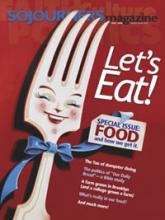“WHAT IS THIS—some kind of school project? You guys aren’t homeless, are you?” asked the clean-cut young policeman with well-gelled hair. His confusion was understandable. Actually, the first thing he said was, “You’re eating out of the garbage? That’s disgusting.”
Indeed, why would four middle-class guys be pawing through garbage bags looking for food? Officer Hair Gel vainly tried to fit us into a category that made sense to him. “Is this for some kind of frat thing?”
His squad car was soon joined by another, and then another. Soon five cruisers surrounded us, making blue and red disco effects on the strip mall alley walls. Must have been a slow night in Fairfax County. We suppressed giggles as we sat on the rear bumper of my station wagon and had our IDs checked.
We must’ve looked pretty shady prowling behind the bakery with our flashlights and bags of loot. But all we were looking for was the bounty of discarded bagels, breads, and pastries we’d come to expect there. We offered the officer a choice muffin. He declined with a smirk. “I can’t stop you from doing this, but a bunch of guys sneaking around behind these stores looks pretty suspicious. Next time you might get shot.”
Thanks for the advice, officer, but at these prices it’s worth the risk.
Dumpster diving has always been a respectable way for penniless students and group houses to acquire furniture and appliances. But why run the risk of harassment, embarrassment—and yes, illness—to scavenge food?
Reason number one—you get a lot of really, really good food really, really free. I often come away with a decent segment of the food pyramid: vegetables, meat, milk, eggs, and almost always lots of bread. And we’re not talking Wonder Bread—we’re talking sprouted wheat berry, pita, ciabatta, foccacia, and any number of Mediterranean-themed baked goods.
Though I’ll occasionally supplement my dumpster bounty with a trip to the natural foods co-op for some local produce or organic oats for homemade granola (bring on the stereotypes), I’ve come to rely mostly on society’s waste for my provision. As Jesus taught, “Do not worry, saying, ‘What will we eat?’ or ‘What will we drink?’ or ‘What will we wear?’...Your heavenly Father knows that you need all these things” (Matthew 6:32). In this spirit, dumpstering’s spontaneity is both liberating and satisfying. Instead of the anxiety of bargain-hunting among the throngs at corporate übermarkets, I enjoy the surprises of late-night expeditions and never worry about finding enough to eat.
Read the Full Article

